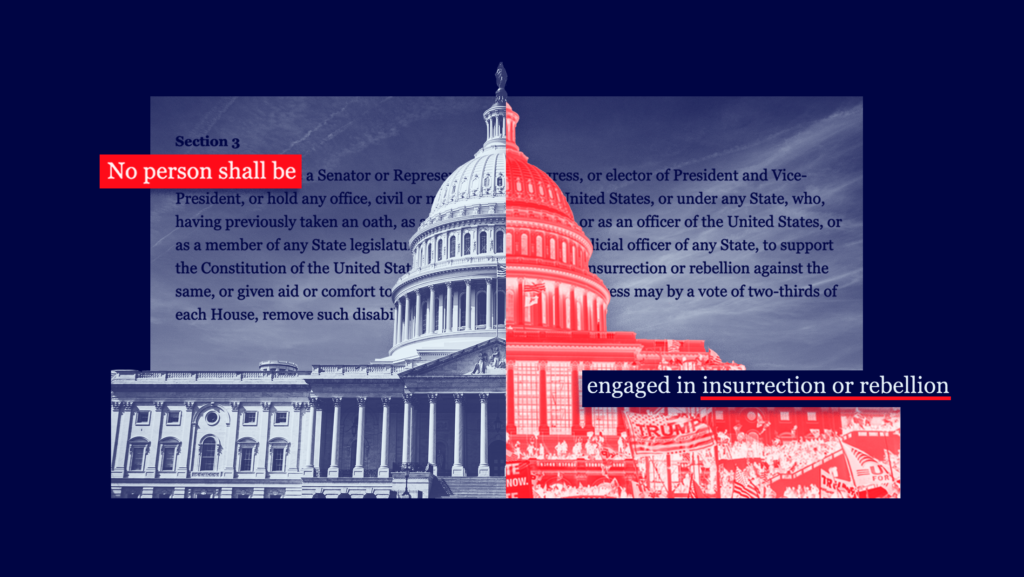Naming the Insurrection

In a healthy democracy, words matter and actions have consequences. A year after the violent attempt to block the peaceful transfer of power, our country is still searching for the right words to describe it and meaningful consequences for its perpetrators. Our democracy is not healthy.
Major news outlets continue to describe the events of Jan. 6, 2021 as a “riot,” while Tucker Carlson forced Senator Ted Cruz to grovel and apologize for calling it a “terrorist attack.”
President Biden explained it correctly in his address last week:
“This wasn’t a group of tourists. This is an armed insurrection. They weren’t looking to uphold the will of the people. They were looking to deny the will of the people. They were looking to uphold – they weren’t looking to hold a free and fair election. They were looking to overturn one. They weren’t looking to save the cause of America. They were looking to subvert the Constitution.”
As soon as he lost that election, Donald Trump, his campaign, and allies — including high-ranking officials in the White House, U.S. Department of Justice and Congress — engaged in a concerted effort to undermine the results of a free and fair election. These efforts included abuse of official power, frivolous litigation and the purposeful spread of disinformation about the integrity of our elections and the results.
Republicans who were more loyal to Trump than the country pressured state and local election officials to disregard the accurate election results and present Congress with incomplete or falsified state results. Trump’s inner circle implored the vice-president to ignore his oath of office and refuse the certification of election results in Congress.
When it became clear that these efforts would fail, Trump and his allies hatched a new plan to disrupt the certification of the election results on the date specified by law, Jan. 6. Their convoluted argument was this: If Congress failed to accept the results on that date, Trump could claim that no lawful certification by Congress had taken place and, as a result, he could remain in power. While Republican members of Congress engaged in coordinated dilatory actions to slow the process, Trump’s supporters stormed the U.S. Capitol.
Most Republicans have minimized the events of that day by referring to them as protests. An uncertain media has alternately called Jan. 6 a protest, riot and, on occasion, insurrection. Calling it a protest sanitizes the ugliness of the event and ignores its actual purpose – to disrupt the peaceful transfer of power. A riot suggests that it was spontaneous and disorganized. The events of Jan. 6 were neither. Correctly labeling it an insurrection makes clear that the violence was planned and aimed at the government.
The term insurrection has legal consequences as well. Specifically, Section 3 of the 14th Amendment prohibits future service in Congress or as an officer of the United States for anyone who has previously served in Congress or as an officer of the United States and who“engaged in insurrection or rebellion against the [United States], or given aid or comfort to the enemies thereof.” Though insurrection can also be a criminal offense, the Constitutional disability against serving in Congress does not require a criminal conviction.
It seems quite likely that one or more Republican members of Congress will be subject to this disqualification, and it is important that we start to identify them now. Republicans will inevitably argue that enforcing the disqualification provision will harm their chances in the upcoming midterm elections. That is why members of Congress who may not be constitutionally eligible to serve should be identified now so that other candidates can qualify and campaign for those offices.
Preferably, the Department of Justice would lead this effort. Nonpartisan career lawyers should evaluate not just the criminal liability of people involved in the insurrection, but constitutional disqualification under the lower civil standard of proof.
However, if the Department fails or refuses to do so, Congress and private litigants will need to step in to vindicate this constitutional disqualification. One way or another, we cannot allow our government to be run by people who have violated their oaths of office and engaged in insurrection against the United States. Not acting to prevent this would itself be a violation of the Constitution.
Some will say that this is unnecessarily provocative or alienating. They will claim that it is too political, but they are wrong. History teaches against appeasing hate and placating extremism in the vain hope that by not confronting bad people, they will suddenly become good.
President Biden was correct. On Jan. 6, 2021, armed insurrectionists breached the Capitol to prevent Congress from certifying the results of the 2020 presidential election. If we are to remain a democracy, we must be clear in our words and steadfast in our actions to prevent this in the future.